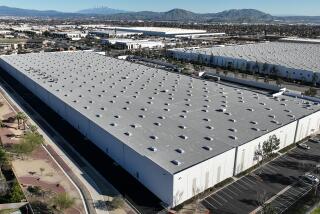Big-Box Boogeyman
The nation’s leading retailer of everything from diapers to dog food, Wal-Mart is loved and loathed. Bargain hunters covet its famously low prices, and some economists credit Wal-Mart’s cost-wringing efficiencies as holding down inflation and boosting productivity. But the rippling “Wal-Mart effect,” as The Times reported last November in a three-part series, is not so rosy.
A group of Los Angeles City Council members, grasping to retain middle-class jobs and protect small businesses from these negative effects, proposes what amounts to an outright ban on Wal-Mart “supercenters” -- giant Wal-Mart discount stores that also sell groceries. The ban will soon go before the full City Council, and supporters predict speedy approval.
Deep-pocketed Wal-Mart would almost certainly challenge a ban in court or at the ballot box, but that isn’t the only reason it deserves a wider public hearing.
The issues boil down to this: The world’s largest corporation pays its employees such stingy wages and medical benefits that many turn to food stamps and overburdened public hospitals -- at taxpayers’ expense. Meanwhile, numerous studies, including one used to develop the proposed L.A. ordinance, say Wal-Mart’s aggressive expansion into grocery sales is driving unionized grocery stores that pay good wages out of business. Even before the first of 40 planned California supercenters opens in La Quinta in early March, Wal-Mart’s low wages were central to the labor dispute between the state’s three major supermarket chains and the grocery workers union. The bitter strike and lockout is now in its fifth month.
Nationwide, a small but growing number of cities and counties, with union backing, have sought to ban grocery-selling supercenters. The bans don’t name Wal-Mart, but they exempt big-box stores like Home Depot that don’t sell groceries and membership clubs like Costco that do, so Wal-Mart argues with some justification that it is being singled out.
The proposed Los Angeles ordinance would ban grocery-selling superstores only in defined “economic assistance areas,” where the city has used tax incentives or other public subsidies to create jobs, fight blight and revitalize poor neighborhoods. The ordinance would cover from 40% to 60% of Los Angeles, but given high prices and a dearth of commercial land outside of those areas, it would amount to a ban citywide. Councilman Eric Garcetti, a co-sponsor, argues that the city has a right to protect its public investment against a Wal-Mart that would chase out better-paying grocery stores and leave abandoned buildings that add to blight.
This assumes, however, that the economic assistance zones have produced jobs worth protecting. Unfortunately, the mayor’s office could not produce records to back that up. Councilman Bernard C. Parks, who opposes a ban, says the low-income South L.A. neighborhoods he represents would welcome Wal-Mart, not just as a step up from jobs in fast-food restaurants but as a source of high-quality, low-priced groceries, also in far too short supply in his district.
Regular Wal-Mart stores have helped revitalize dying shopping centers in Crenshaw Plaza and Panorama Mall, serving as anchors after other department stores moved out. That’s what’s wrong with a one-size-fits-all ban: It fails to take into account communities’ differing needs. It also invites a backlash from consumers who have made Wal-Mart the retail leader that it is. Surveys show that even some union members shop there.
At the same time -- and as a sign of how complicated this issue is -- even the Los Angeles Area Chamber of Commerce and the downtown Central City Assn., stalwart defenders of free markets, worry about supercenters’ effects on the local companies that make up much of their membership. But they point out that a Los Angeles ordinance wouldn’t stop Wal-Mart from opening supercenters in the county’s 87 other cities with the same deleterious results -- while sapping sales tax revenue from L.A.
Three years ago, the City Council considered a Wal-Mart ban but opted instead for case-by-case evaluations of all big-box retailers to take into account “material adverse impacts” on the surrounding community. Perhaps the directive needs fine-tuning, but isn’t it too early to throw out this more flexible approach?
City planners already ask questions about design and effects on traffic before approving any new developments. In economic assistance areas specifically, the city has the right now to deny an inappropriate business the kind of tax breaks or help with assembling land that even as rich a company as Wal-Mart routinely seeks.
Governments must rigorously investigate allegations that Wal-Mart forces employees to work overtime without pay, discriminates against women and prohibits legal union-organizing drives.
But low wages, paltry benefits and outsourced manufacturing are societal problems that are bigger than Wal-Mart. Banning one company won’t solve them.
More to Read
Inside the business of entertainment
The Wide Shot brings you news, analysis and insights on everything from streaming wars to production — and what it all means for the future.
You may occasionally receive promotional content from the Los Angeles Times.










